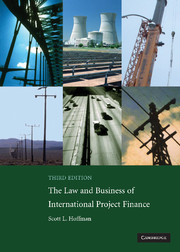 The Law and Business of International Project Finance
The Law and Business of International Project Finance Book contents
- Frontmatter
- Contents
- Preface to the Third Edition
- Preface to the Second Edition
- Preface to the First Edition
- PART ONE AN INTRODUCTION TO PROJECT FINANCE
- PART TWO RISK IDENTIFICATION, ALLOCATION, AND MITIGATION
- PART THREE PROJECT FINANCE STRUCTURES
- PART FOUR TECHNICAL, POLITICAL, AND ECONOMIC FEASIBILITY
- PART FIVE PROJECT FINANCE DOCUMENTATION
- PART SIX CREDIT ENHANCEMENT
- PART SEVEN DEBT AND EQUITY FINANCING
- PART EIGHT COLLATERAL
- PART NINE PROJECT SPONSOR AND INVESTOR AGREEMENTS
- PART TEN SPECIAL TOPICS IN PROJECT FINANCE
- CHAPTER TWENTY-EIGHT BANKRUPTCY
- CHAPTER TWENTY-NINE UNITED STATES LAWS AFFECTING FOREIGN INVESTMENTS
- CHAPTER THIRTY LOCAL LAWYERS AND OVERVIEW OF LOCAL LAWS
- CHAPTER THIRTY-ONE DISPUTE RESOLUTION IN PROJECT FINANCE TRANSACTIONS
- CHAPTER THIRTY-TWO MULTILATERAL AGENCY PROHIBITIONS ON ANTI-COMPETITIVE ACTIVITY
- CHAPTER THIRTY-THREE MERCHANT FACILITIES – PROJECT FINANCE WITHOUT CONTRACTUALLY ASSURED REVENUE FLOWS
- Appendix A A Checklist of Due Diligence Considerations for a Project Financing
- Appendix B UNCITRAL Legislative Guide on Privately Financed Infrastructure Projects
- Project Finance Terms, Abbreviations, and Acronyms
- Select Bibliography
- Index
CHAPTER THIRTY - LOCAL LAWYERS AND OVERVIEW OF LOCAL LAWS
from PART TEN - SPECIAL TOPICS IN PROJECT FINANCE
Published online by Cambridge University Press: 05 June 2012
- Frontmatter
- Contents
- Preface to the Third Edition
- Preface to the Second Edition
- Preface to the First Edition
- PART ONE AN INTRODUCTION TO PROJECT FINANCE
- PART TWO RISK IDENTIFICATION, ALLOCATION, AND MITIGATION
- PART THREE PROJECT FINANCE STRUCTURES
- PART FOUR TECHNICAL, POLITICAL, AND ECONOMIC FEASIBILITY
- PART FIVE PROJECT FINANCE DOCUMENTATION
- PART SIX CREDIT ENHANCEMENT
- PART SEVEN DEBT AND EQUITY FINANCING
- PART EIGHT COLLATERAL
- PART NINE PROJECT SPONSOR AND INVESTOR AGREEMENTS
- PART TEN SPECIAL TOPICS IN PROJECT FINANCE
- CHAPTER TWENTY-EIGHT BANKRUPTCY
- CHAPTER TWENTY-NINE UNITED STATES LAWS AFFECTING FOREIGN INVESTMENTS
- CHAPTER THIRTY LOCAL LAWYERS AND OVERVIEW OF LOCAL LAWS
- CHAPTER THIRTY-ONE DISPUTE RESOLUTION IN PROJECT FINANCE TRANSACTIONS
- CHAPTER THIRTY-TWO MULTILATERAL AGENCY PROHIBITIONS ON ANTI-COMPETITIVE ACTIVITY
- CHAPTER THIRTY-THREE MERCHANT FACILITIES – PROJECT FINANCE WITHOUT CONTRACTUALLY ASSURED REVENUE FLOWS
- Appendix A A Checklist of Due Diligence Considerations for a Project Financing
- Appendix B UNCITRAL Legislative Guide on Privately Financed Infrastructure Projects
- Project Finance Terms, Abbreviations, and Acronyms
- Select Bibliography
- Index
Summary
INTRODUCTION
The local law of the host country of a project is an integral part of project feasibility. Local lawyers are, of course, an excellent source of this information. In addition, summaries and overviews are available from publicly available information sources and libraries.
LOCAL LAWYERS
Need and Timing
Identification and selection of local lawyers for a project financing is important to the success of a project. An understanding of the local law during the structuring of the project and the importance of an understanding of these laws during negotiation with the host government and local participants require that local lawyers be interviewed and retained as early as possible in project development.
In a country with a small number of competent law firms, competition among the various project participants for these firms is often intense. This requires that the local firm be retained very early in the project development process.
Identifying Competent Lawyers
Identification of potential local law firms is often made by referrals from large law firms. This is an increasingly effective source of information as large law firms in industrialized countries have developed international capabilities and established local offices in foreign countries, merged with foreign law firms, or established correspondent arrangements or other informal alliances.
- Type
- Chapter
- Information
- The Law and Business of International Project FinanceA Resource for Governments, Sponsors, Lawyers, and Project Participants, pp. 400 - 403Publisher: Cambridge University PressPrint publication year: 2007


